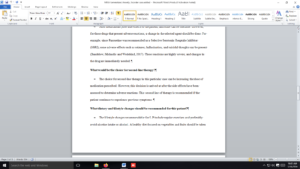Anxiety Disorder case
L.P., age 23, is a white woman who graduated from college last year. She began working as an accountant 1 month after graduating. Approximately 2 months ago, she moved into a two-bedroom apartment with another woman who works at the same accounting firm. She states that her roommate recommended that she see a doctor to find out if she has anemia or “some sort of fatigue syndrome.” She states that she has felt “restless” and “on edge” for most of the past 9 months. She becomes easily fatigued and irritable and has difficulty concentrating and falling asleep. She states that sometimes her mind “just goes blank,” and she is worried that her work performance is no longer excellent. She reports that all her life she had good grades in school and was very successful in everything she attempted. Although she has been “a worrier from the day I was born,” now she worries more than she ever has and feels nervous “all the time.” L.P. reports that she has a good relationship with her boyfriend, but they do not get to see each other very often because he is attending graduate school 100 miles away. She reports having a satisfying sexual relationship with him. She denies having any problems with relationships with her parents, roommate, or peers. She denies having any financial worries unless she is fired from her job for poor work performance. She reports that she has always been healthy and has taken good care of herself. The only medication she takes is birth control pills, which she has taken for the past 4 years without any adverse effects.
Diagnosis: Generalized Anxiety Disorder
Questions:
1. List specific treatment goals for L.P.
2. What drug therapy would you prescribe? Why?
3. What are the parameters for monitoring the success of the therapy?
4. Describe specific patient monitoring based on the prescribed therapy.
5. List one or two adverse reactions for the selected agent that would cause you to change therapy.
6. What would be the choice for second-line therapy?
7. What dietary and lifestyle changes should be recommended for this patient?
Requirements: 1 page
Answer preview
Most medications pose side effects to the patient, and some can be tolerable. However, for those drugs that present adverse reactions, a change in the selected agent should be done. For example, since Paroxetine was recommended as a Selective Serotonin Reuptake Inhibitor (SSRI), some adverse effects such as seizures, hallucination, and suicidal thoughts can be present (Bandelow, Michaelis and Wedekind, 2017). These reactions are highly severe, and changes in the drug are immediately needed.
What would be the choice for second-line therapy?
The choice for second-line therapy in this particular case can be increasing the dose of medication prescribed. However, this decision is arrived at after the side effects have been assessed to determine adverse reactions. This second line of therapy is recommended if the patient continues to experience previous symptoms.
[554 Words]

Anxiety Disorder case

